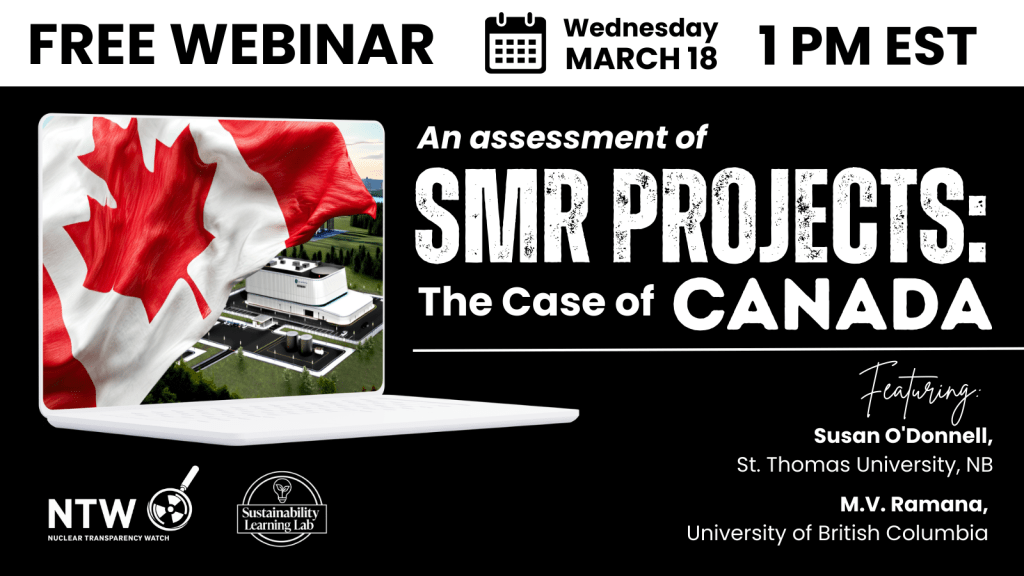Has the nuclear lobby hijacked Welsh democracy?
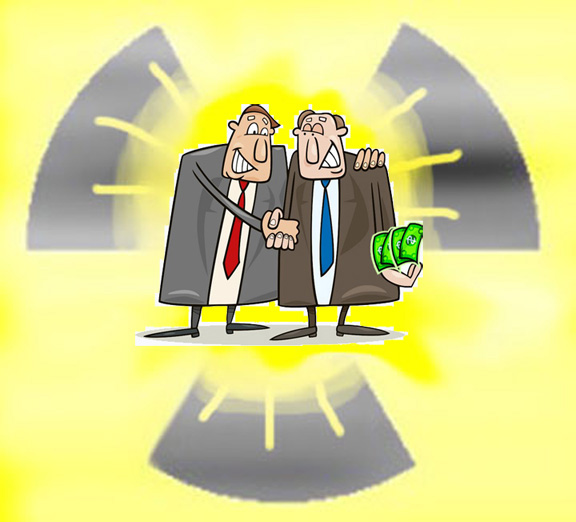
25 Feb 2024, Robat Idris https://nation.cymru/opinion/has-the-nuclear-lobby-hijacked-welsh-democracy/
A sadly but unsurprising travesty of democracy slid out of Cardiff Bay with the release of the Senedd’s Economy, Trade and Rural Affairs Committee report on “Nuclear Energy and the Welsh Economy” on 21st February.
As a case study in lobbying power, it is surely worthy of inclusion in the Hall of Infamy.
Its recommendations could have been written by the nuclear lobby itself, rather than by our democratically elected Senedd Members.
Despite the collapse of the Wylfa project in 2019, all of the recommendations enthusiastically back the case for nuclear, with a plea to the UK Government to get on with the job. Einstein reportedly said: “Insanity is doing the same thing over and over again and expecting different results”.
Informed voices
If we are to have a credible Senedd, and a real democracy, then it is crucial that informed voices are heard.
This report, pandering to the self-interest of denizens of the nuclear village, merely reinforces the view that politics is about kowtowing to powerful corporate interests.
Meanwhile Cymru bleeds while real and credible solutions to energy and jobs exist.
The blurb preceding the report assures us that: “The Welsh Parliament is the democratically elected body that represents the interests of Wales and its people”. Yet this Committee took oral evidence from nine pro-nuclear individuals, and written evidence from six pro-nuclear organisations, and none from any individual or organisation having an anti-nuclear or indeed a sceptical view.
The rationale for this appears to be that the terms of reference deliberately chose not to include other voices:
“The terms of reference for this one-day inquiry were to consider the potential economic impact of new nuclear developments in north Wales, how to maximise local employment and benefits to local or Wales-based supply chains of new nuclear projects, and the challenges posed by skills shortages and how to overcome them. By its nature the inquiry did not examine the pros and cons of nuclear energy itself, but recognised its place in an overall energy security strategy and net zero targets.”
Apparently the only relevant voices are those backing nuclear.
The committee’s duty is to the people of Cymru, and not to the nuclear industry, or to the desire of the UK to remain a nuclear armed state.
Balanced view
As should be apparent if the Wellbeing of Future Generations Act is taken seriously. This is such a vital matter that evidence should be given to the committee which would enable its members to form a fully informed and balanced view on nuclear energy.
Why wasn’t evidence sought from experts and interested parties on such questions as:
- why new nuclear may never happen.
- why nuclear can’t be built in time to influence climate change.
- why should Cymru support civil nuclear when the UK Government admits its intrinsic links with military nuclear weapons capability?
- why should such reliance be placed on the voices of an industry which consistently fails to deliver on cost and on time?
- why should Cymru accept nuclear when renewable energy technology can provide 100% of our energy needs?
- why should Ynys Môn and Gwynedd become a nuclear dump to satisfy the needs of the nuclear industry and the UK state?
- why should we believe that the effects on language, culture, biodiversity can be mitigated?
- why have an influx of workers at a time when housing is a major issue for local people, when the NHS is on the point of collapse, when council services are creaking?
- why does the Welsh Government not acknowledge that nuclear is in retreat globally?
It’s time to recognise that the priority for Cymru is to look to our own natural resources for energy and job solutions. If fully harnessed, offshore wind has the potential to provide double our energy needs.
And why don’t our Senedd Members look critically at the companies which gave evidence?
- In 2020 the American company Bechtel had to pay (with another company) $57.5 million to the US Department of Justice for irregularities at the Hanford Waste Treatment Plant (Hanford is considered to be the most toxic nuclear waste facility in the US). In 2008 it had to pay (with another company) $407 million to the state and federal governments to settle litigation over leaky tunnels and a fatal ceiling collapse in the Boston Big Dig project.
- Rolls-Royce make the nuclear engines for Trident submarines which carry nuclear weapons. The company has publicly stated that there are synergies between the civil and military nuclear industries. Its Small Modular Reactor Design is unlicenced and unproven, and as for being small, it is at 470 MW twice the size of the old Trawsfynydd reactors. Rolls-Royce’s new CEO Tufan Erginbilgic described the company as a “burning platform” as 2.500 job cuts were announced in 2023.
Caught up amongst the corporate and academic behemoths, Ynys Môn council leader Llinos Medi inherited the poisoned chalice of support for nuclear from her predecessors. Like many of us on Ynys Môn, she has a burning desire for our youngsters to have a future locally, and for the language to thrive.
Can she be persuaded that another, better, way can be found?
The Council’s support for a future project at Wylfa is “based on confirmation that the development is sustainable and that it should not be at the expense of the island’s communities”. Nowhere on the globe is nuclear sustainable, and communities worldwide have paid the price. Not only in Chernobyl and Fukushima, but in many countries where uranium is mined and land, water and workers are poisoned.
On Saturday 16th March PAWB (People Against Wylfa B), backed by other concerned organisations, is holding an open meeting called “Green Revolution – Opportunity Knocks” to open minds to the possibilities of truly sustainable economic and community growth in Ynys Môn and Gwynedd. Perhaps members of the Economy, Trade and Rural Affairs Committee should attend!
Robat Idris is a member of PAWB. He is also vice-chair of Cymdeithas y Cymod, member of CND Cymru and past chair of Cymdeithas yr Iaith. He contributed a chapter on “Atomic Wales” in “The Welsh Way”.
The Cost of Nuclear War in Space

Putting a weapon into orbit is not just a military threat. It’s also a risk to the billions of dollars pouring into the space economy.
https://www.nytimes.com/2024/02/24/business/dealbook/the-cost-of-nuclear-war-in-space.html By Ephrat Livni and Vivienne Walt
Just before the Russian-Ukrainian war reached its two-year milestone today, U.S. intelligence agencies warned that Russia might aim a nuclear weapon at an unusual target: not any place on Earth, but satellites orbiting in space.
Putting a weapon into orbit is not just a military threat. It’s also a risk to the space economy — and the one on the ground. There is a little-known but fast-growing industry that insures satellites, but it doesn’t provide insurance against nuclear arms.
What’s at stake: hundreds of billions (and probably trillions) of dollars when including the services that rely on satellites, according to David Wade, an underwriter at the Atrium Space Insurance Consortium, which insures satellites for Lloyd’s.
Of more than 8,000 satellites in orbit, thousands belong to private companies, according to Orbiting Now, a site that compiles real-time satellite tracking data from NASA and other sources. The Russian weapon is said to be designed to target satellites in low Earth orbit, where most commercial satellites operate.
SpaceX’s Starlink dominates the space-based internet services industry, and Amazon also has big aspirations in space. But the sharp drop in launch costs in recent years — driven largely by SpaceX — has made entry possible for many smaller players, leading to a satellite-business frenzy that prompted the Federal Communications Commission to open a Space Bureau last year.
Wade estimated the total value of all insured satellites in orbit at $25 billion. That doesn’t include the revenue they generate. The Satellite Industry Association estimated revenues for nongovernmental satellite services at $113 billion in 2022.
Investment in the space economy is increasing quickly. Space activity could total $620 billion this year, according to the most recently available estimate. That’s up from $545 billion in 2022, according to an estimate from the Space Foundation, a nonprofit that promotes space education and enterprise.
Aspirations for the space economy include mining for rare minerals and water, tourism, communications, and data transfer infrastructure. On Thursday, a lunar lander from Intuitive Machines, traveling on a SpaceX rocket, became the first private craft to land on the moon, which some are hopeful leads to mining for water that could be used to make fuel for more distant industrial missions.
A space weapon would cast a pall across other businesses, too. Industries from agriculture to tech depend on satellites, and sectors like shipping, transport, banking and supply chain management rely on GPS, which uses satellites. The threat would also have “a depressive effect” on space company valuations broadly, said Donald Moore, C.E.O. of the Space Finance Corporation and a space policy lecturer at the University of Michigan Law School.
The new threat could also put a dent in the U.S. government’s plans to rely on private players just as the Department of Defense is expected to release details of a new strategy to integrate commercial satellites in national security, noted Brian Weeden, the chief program officer for the Secure World Foundation, a nonprofit that works on space policy.
Some are skeptical of the risk. The precise effects would depend on unknowns about the weapon, company contingency planning and other factors. “We could still communicate,” said Henry Hertzfeld, a space policy professor at George Washington University and former chief economist at NASA. “We still have some landlines,” he added, speaking from his office phone. And he doubts that Russia will introduce this menace, as it would also endanger its space activities. Notably, it would also violate an international space treaty.
But the risk is not covered by insurance. “Exclusions for acts of war, antisatellite devices and nuclear reaction, nuclear radiation or radioactive contamination (except for radiation naturally occurring in the space environment) are typically listed in a space insurance policy,” Wade said in an email.
The U.S. space model depends heavily on commercialization, noted Russell Sawyer, a space insurance broker at Lockton in London. The government has pushed risk out onto private companies, he said, and this trend could shift if this nuclear threat really is serious: “The government would be needed.” — Ephrat Livni
Biden administration restores Trump-rescinded policy on illegitimacy of Israeli settlements
BY MATTHEW LEE, February 24, 2024
WASHINGTON (AP) — The Biden administration on Friday restored a U.S. legal finding dating back nearly 50 years that Israeli settlements in the occupied Palestinian territories are “illegitimate” under international law.
Secretary of State Antony Blinken said the U.S. believes settlements are inconsistent with Israel’s obligations, reversing a determination made by his predecessor, Mike Pompeo, in the Biden administration’s latest shift away from the pro-Israel policies pursued by former President Donald Trump.
Blinken’s comments came in response to a reporter’s question about an announcement that Israel would build more than 3,300 new homes in West Bank settlements as a riposte to a fatal Palestinian shooting attack.
It wasn’t clear why Blinken chose this moment, more than three years into his tenure, to reverse Pompeo’s decision. But it came at a time of growing U.S.-Israeli tensions over the war in Gaza, with the latest settlement announcement only adding to the strain. It also came as the United Nations’ highest court, the International Court of Justice, is holding hearings into the legality of the Israeli occupation.
Biden administration officials did not cast Blinken’s comments as a reversal — but only because they claim Pompeo’s determination was never issued formally. Biden administration lawyers concluded Pompeo’s determination was merely his opinion and not legally binding, according to two administration officials who spoke on condition of anonymity to discuss private discussions.
But formally issued or not, Pompeo’s announcement in November 2019 was widely accepted as U.S. policy and had not been publicly repudiated until Blinken spoke on Friday.
Speaking in the Argentine capital of Buenos Aires, Blinken said the U.S. was “disappointed” to learn of the new settlement plan announced by Israel’s far-right firebrand finance minister, Bezalel Smotrich, after three Palestinian gunmen opened fire on cars near the Maale Adumim settlement, killing one Israeli and wounding five.
Blinken condemned the attack but said the U.S. is opposed to settlement expansion and made clear that Washington would once again abide by the Carter administration-era legal finding that determined settlements were not consistent with international law.
“It’s been longstanding U.S. policy under Republican and Democratic administrations alike that new settlements are counter-productive to reaching an enduring peace,” he said in his news conference with Argentine Foreign Minister Diana Mondino.
“They’re also inconsistent with international law. Our administration maintains a firm opposition to settlement expansion and in our judgment this only weakens, it doesn’t strengthen, Israel’s security,” Blinken said……………………………….. more https://apnews.com/article/israel-settlements-illegitimate-palestine-biden-rescind-law-0bed7cf5d6f98012193e9f5075eb719a
Shock Horror! Serious risk TO INVESTORS of nuclear war in space!

Are investors prepared for *checks notes* nuclear war in space? Space boom, meet actual boom
F.com Sinead O’Sullivan FEBRUARY 24 2024 Sinéad O’Sullivan is a former Senior Researcher at Harvard Business School’s Institute for Strategy and Competitiveness.
Imagine if a country launched a 1.4-megaton nuclear warhead into space and detonated it 400 kilometres above the Pacific Ocean, generating such a huge burst of electromagnetic energy that it resulted in an artificial aurora while disrupting electrical systems over land masses up to 1,500km away and destroying several satellites…………………………………..
This actually happened in 1962. And the actor, naturally, was the United States of America. In the early 1960’s, the United States conducted a series of nuclear tests in space, which were primarily aimed at studying the effects and potential military applications of deploying nuclear weapons in space. The explosion test, called Starfish Prime, was a high-altitude nuclear test conducted as a joint effort of the Atomic Energy Commission and the Defense Atomic Support Agency.
One of the test’s consequences was to catalyse Russian enthusiasm for some ground rules: the Outer Space Treaty was adopted by the United Nations General Assembly a few years later, in 1967……
Today, most people — including investors who have bet billions of dollars on SpaceX’s Starlink constellation — have probably not heard of Starfish Prime, and don’t worry much about the impact of mega-radiation war in space………………….
Regardless, what we do know is that any nuclear weapon in space would — along with a great number of other consequences — pose a huge risk to the $300bn of private capital invested into the space sector in the last decade………………..
It is unideal that there are currently no globally binding rules that protect investor interests and assets in space. Consider the $180bn valuation of SpaceX, which is largely credited to its Starlink satellite communications constellation. This constellation could disappear in the space of minutes with the use of a single nuclear anti-satellite weapon in space — Russian or otherwise. It is possible many investors have not considered that a single adversarial event could destroy value so quickly. …………………………………..
The Outer Space Treaty says that nations cannot militarise space, place weapons in space, or take ownership of any celestial space bodies. This makes it an established investor’s friend, not foe — especially if that investor is American.
It is overseen by the United Nations Committee on the Peaceful Uses of Outer Space (UN COPUOUS), but this body cannot legally mandate any nation to follow it. After all, in the jurisdiction of space, adherence is done via the complex mechanisms of diplomacy, something capital markets grossly lack……………….. https://www.ft.com/content/5a9c4477-6db9-4ea5-8ba2-7065f2370b02
Tax-payer to take bigger financial risks under new payment plan for nuclear command satellites
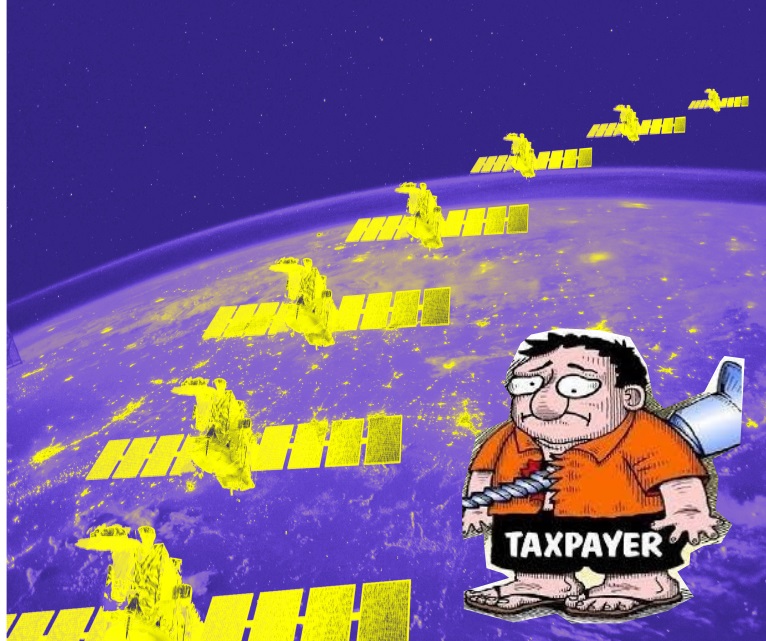
Under cost-plus or cost-reimbursement contracts, the government pays contractors for allowed expenses, plus an agreed upon profit margin. In fixed-price agreements, the contractor is paid a negotiated amount regardless of expenses incurred.
the development will move forward with the government absorbing the inherent risks.
Space Force bucks fixed-price trend for nuclear command satellites
Acquisition executive Frank Calvelli said the Space Force will award cost-plus contracts for the upcoming Evolved Strategic Satellite Communications System
Space News Sandra Erwin, February 26, 2024
WASHINGTON — In a departure from recent guidance, the Space Force will use cost-plus contracts for its high-priority strategic communications satellite program.
Space Force acquisition executive Frank Calvelli said Feb. 23 that the service has decided to not use fixed-price contracts for the Evolved Strategic Satellite Communications System (ESS), a critical component of the U.S. military’s nuclear command, control, and communications (NC3) network that provides nuclear-survivable communications.
Calvelli has previously indicated a preference for fixed-price contracts as a means to control costs and incentivize efficiency in satellite procurements. However, he said that an exception will be made for the ESS program.
Boeing and Northrop Grumman were selected in 2020 to build ESS satellite prototypes but Calvelli suggested that these designs are not mature enough to transition to fixed-price production.
“It’s not as far along as I would like for us to probably use fixed price,” Calvelli said at an event hosted by the Center for Strategic and International Studies.
The ESS program is estimated to be worth $8 billion. These new satellites are intended to augment and eventually replace the Advanced Extremely High Frequency (AEHF) network of nuclear-hardened satellites made by Lockheed Martin.
Draft solicitation in the works
Calvelli said the Space Systems Command is still working on a draft solicitation for ESS proposals, expected to be released this year.
He said he had expected the ESS payload designs to be more mature by now and nearing the prototyping stage. ESS was one of the programs selected for rapid-prototyping under a Pentagon initiative known as “middle tier acquisition”
“But it seems like we spent a lot of time in MTA just doing tech risk reduction or technology maturity,” said Calvelli. “Had we built a real payload or actually built the prototype, then maybe we could actually go off and do something fixed-price.”
Under cost-plus or cost-reimbursement contracts, the government pays contractors for allowed expenses, plus an agreed upon profit margin. In fixed-price agreements, the contractor is paid a negotiated amount regardless of expenses incurred.
Cost-plus contracts are used in higher risk projects where technical requirements are uncertain or unknown and the work involves “non-recurring engineering.” These are upfront costs associated with the design and development of a new product.
“Given the amount of NRE that still has to go into the ESS program, and feedback I’ve gotten from industry, we are probably looking more towards the traditional cost-plus model for something like that,” Calvelli said.
The use of cost-plus versus fixed-price contracts has been a contentious issue recently, with some defense companies experiencing significant losses on fixed-price contracts. Executives from major defense contractors, including Boeing, Northrop Grumman and Lockheed Martin, have warned that they would be reluctant to bid on some fixed-price programs due to the financial risk.
Calvelli has said the preference is to use fixed-price vehicles once new systems are proven but ESS does not meet that threshold so the development will move forward with the government absorbing the inherent risks.
No excuses for late deliveries
Calvelli during his talk at CSIS also said he plans to crack down on program delays, especially those blamed on supply chain woes or pandemic impacts. ……………………………….. https://spacenews.com/space-force-bucks-fixed-price-trend-for-nuclear-command-satellites/
China is ‘unlikely’ to lift import ban on Japanese seafood as dumping continues
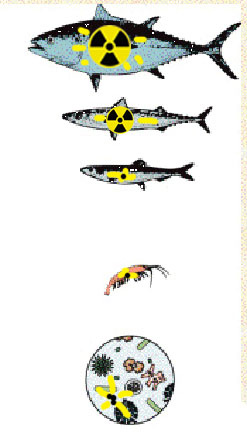
predatory species higher up in the food chain have a greater chance of experiencing bioaccumulation and biomagnification of radioactive substances. As time goes on and more nuclear-contaminated water is discharged, the negative effects will only increase
By GT staff Feb 25, 2024 , https://www.globaltimes.cn/page/202402/1307658.shtml
Half a year after Japan opened Pandora’s box by dumping nuclear-contaminated wastewater from the crippled Fukushima Daiichi nuclear power plant into the ocean, Japanese media are discussing the possibility of bilateral talks for getting China to revoke its import ban on Japanese marine products, in an apparent attempt to test the waters.
In response, Chinese experts told the Global Times on Sunday that, in the short term, it is unlikely that China will revoke the ban as there are currently no conditions for a withdrawal.
Meanwhile, a Kyodo News survey on Friday showed that most Japanese fishery groups have been affected by the discharge, with many feeling the impact through China’s import ban on Japanese seafood.
The survey found that 29 out of 36 respondents among the members of the National Federation of Fisheries Cooperative Associations said they “had felt” or “had somewhat felt” negative effects, including financial damage due to the contaminated water dumping, overwhelmingly due to the subsequent import ban by China.
Chinese Foreign Ministry spokesperson Mao Ning said at a regular press conference that the precautionary measures taken by China and some other countries in response to Japan’s move are aimed at protecting food safety and people’s health.
“These measures are entirely legitimate, reasonable and necessary,” Mao said.
Chang Yen-chiang, director of the Yellow Sea and Bohai Sea Research Institute of Dalian Maritime University, revealed several main factors why China is less likely to revoke the ban in the short run.
There is no halt in the ocean discharge, that is, the Japanese side has not withdrawn from their erroneous actions, he said.
Currently, half a year has passed since the dumping began, meaning that under the influence of ocean currents, the impact of Japan’s nuclear-contaminated water discharge on East Asia may just be starting, and further impacts need to be assessed, Chang said.
In addition, predatory species higher up in the food chain have a greater chance of experiencing bioaccumulation and biomagnification of radioactive substances. As time goes on and more nuclear-contaminated water is discharged, the negative effects will only increase, Chang said. “Under these circumstances, how could the ban be lifted?” the expert asked.
TEPCO – operator of the Daiichi plant – plans to release a total of about 54,600 tons of nuclear-contaminated water on seven occasions in the 2024 fiscal year, more than double the amount of 2023, according to media reports.
Chang called on Japan to consider solving the Fukushima nuclear power plant issue on a fundamental level, such as focusing on research on how to handle the burnt-out nuclear reactors. Otherwise, radioactive substances will continue to be produced endlessly, and the discharge of nuclear contamination could last for over 100 years, making the situation increasingly worse.
Japanese media have reported on a series of scandals concerning leaks occurring during the contaminated water discharge process, which led to soil contamination around the nuclear power plant.
Most recently, 1.5 metric tons of highly radioactive water escaped in early February during valve checks at a treatment machine designed to remove cesium and strontium from the contaminated water, according to TEPCO.
According to Japanese experts studying the soil, the radiation levels in Fukushima soil are much higher compared to other areas.
“We should be more vigilant toward crops and plants grown in this contaminated soil. China should increase radioactive testing of Japanese agricultural products and cosmetics imports,” Chang stated.

China is ‘unlikely’ to lift import ban on Japanese seafood as dumping continues
By GT staff reportersPublished: Feb 25, 2024 09:50 PM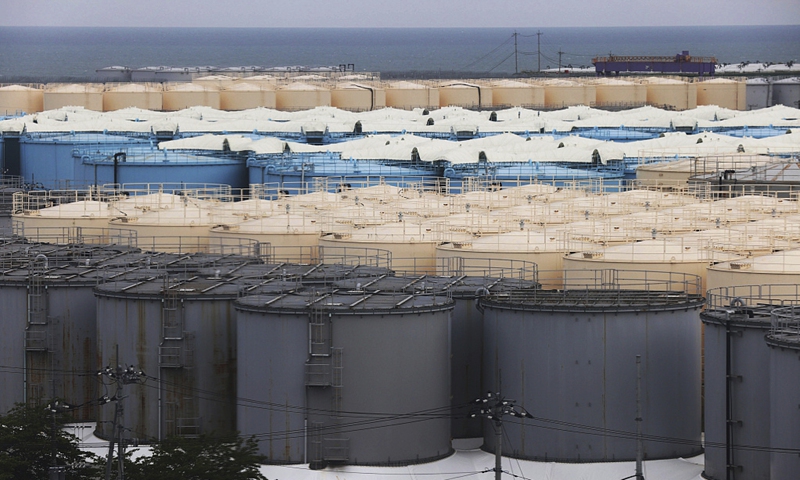
Water tanks near Fukushima Daiichi nuclear power plant in Okuma town of Fukushima prefecture on May 26, 2023 Photo: VCG
Half a year after Japan opened Pandora’s box by dumping nuclear-contaminated wastewater from the crippled Fukushima Daiichi nuclear power plant into the ocean, Japanese media are discussing the possibility of bilateral talks for getting China to revoke its import ban on Japanese marine products, in an apparent attempt to test the waters.
In response, Chinese experts told the Global Times on Sunday that, in the short term, it is unlikely that China will revoke the ban as there are currently no conditions for a withdrawal.
Meanwhile, a Kyodo News survey on Friday showed that most Japanese fishery groups have been affected by the discharge, with many feeling the impact through China’s import ban on Japanese seafood.
The survey found that 29 out of 36 respondents among the members of the National Federation of Fisheries Cooperative Associations said they “had felt” or “had somewhat felt” negative effects, including financial damage due to the contaminated water dumping, overwhelmingly due to the subsequent import ban by China.
Chinese Foreign Ministry spokesperson Mao Ning said at a regular press conference that the precautionary measures taken by China and some other countries in response to Japan’s move are aimed at protecting food safety and people’s health.
“These measures are entirely legitimate, reasonable and necessary,” Mao said.
Chang Yen-chiang, director of the Yellow Sea and Bohai Sea Research Institute of Dalian Maritime University, revealed several main factors why China is less likely to revoke the ban in the short run.
There is no halt in the ocean discharge, that is, the Japanese side has not withdrawn from their erroneous actions, he said.
Currently, half a year has passed since the dumping began, meaning that under the influence of ocean currents, the impact of Japan’s nuclear-contaminated water discharge on East Asia may just be starting, and further impacts need to be assessed, Chang said.
In addition, predatory species higher up in the food chain have a greater chance of experiencing bioaccumulation and biomagnification of radioactive substances. As time goes on and more nuclear-contaminated water is discharged, the negative effects will only increase, Chang said. “Under these circumstances, how could the ban be lifted?” the expert asked.
TEPCO – operator of the Daiichi plant – plans to release a total of about 54,600 tons of nuclear-contaminated water on seven occasions in the 2024 fiscal year, more than double the amount of 2023, according to media reports.
Chang called on Japan to consider solving the Fukushima nuclear power plant issue on a fundamental level, such as focusing on research on how to handle the burnt-out nuclear reactors. Otherwise, radioactive substances will continue to be produced endlessly, and the discharge of nuclear contamination could last for over 100 years, making the situation increasingly worse.
Japanese media have reported on a series of scandals concerning leaks occurring during the contaminated water discharge process, which led to soil contamination around the nuclear power plant.
Most recently, 1.5 metric tons of highly radioactive water escaped in early February during valve checks at a treatment machine designed to remove cesium and strontium from the contaminated water, according to TEPCO.
According to Japanese experts studying the soil, the radiation levels in Fukushima soil are much higher compared to other areas.
“We should be more vigilant toward crops and plants grown in this contaminated soil. China should increase radioactive testing of Japanese agricultural products and cosmetics imports,” Chang stated.
As Japanese industries, including fisheries and cosmetics, have been affected, Japanese media continues to report news about bilateral talks aimed at getting China to revoke its import ban on Japanese marine products, trying to test the reaction from China.
The Asahi Shimbun revealed Friday that nuclear experts from Japan and China started talks in January regarding contaminated water. The report noted that the Chinese side has still shown no signs of ending its import ban.
The Kyodo News reported on Thursday that when Chinese Ambassador to Japan Wu Jianghao met with the leader of the Social Democratic Party, Mizuho Fukushima, in January, China’s import suspension was also discussed, but there were no conditions for lifting the ban at present.
Iran Reduces Near-Weapons-Grade Stockpile, Defying Expectations
Move could signal an effort to de-escalate nuclear tensions with Washington
By Laurence Norman, Feb. 26, 2024
VIENNA—Iran reduced its stockpile of near-weapons-grade nuclear material even as it continued expanding its overall nuclear program, the United Nations’ atomic watchdog said Monday, marking a surprise step that could ease tensions with Washington.
The move comes at a moment when Iran and the U.S. have sought to avoid direct confrontation in the regional conflict that grew out of Hamas’s terrorist attack on Israel on Oct. 7 and Israel’s aggressive response………… (Subscribers only) more https://www.wsj.com/world/middle-east/iran-reduces-near-weapons-grade-stockpile-defying-expectations-ba384777
“Big nuclear reactor” lobby fights back against “Small nuclear reactor” lobby

Can it be possible that the hottest nuclear reactor design in the United
States right now is not a sexy Small Modular Reactor (SMR) or an exotic
advanced reactor but a BBR: Big Boring Reactor?
Specifically, I’m talking about Westinghouse’ flagship AP1000 reactor. Me an a few other nuclear activists have been jumping up and down about how in the wake of the Vogtle
build in Georgia finally coming on line, we need to turn around and build
more AP1000s.
I’m also used to these entreaties falling on deaf ears. For
so long the chorus for new-builds in the US was “Small Modular Reactors
and Advanced only.” With the collapse of NuScale’s first-of-a-kind
(FOAK) Carbon-Free Power Project, there’s also dawning understanding that
SMRs are not magic and are highly subject to FOAK costs too. “For the
first time, three utilities have come to us and said ‘we were thinking
about SMRs but AP1000s seem like a lower risk.’”
Elemental Energy 26th Feb 2024
https://elementalenergy.substack.com/p/rethinking-gigawatt-scale-is-bigger
An Anxious Europe Ponders Nuclear Weapons
To acquire nuclear weapons, European states would have to withdraw from the NPT which would, no doubt, undermine the international rules-based order that they wish to preserve.
Australian Institute of International Affairs, 26 FEB 2024, By Jasper Hufschmidt Morse
After comments made by the US presidential candidate, Donald Trump, some Europeans are considering the possibility of acquiring nuclear weapons. They should think again.
On 10 February, former United States President Donald Trump recounted a conversation with an unnamed European counterpart in which he stated that he “would not protect” them from a possible Russian attack because they failed to allocate two percent of their gross domestic product to defence, and thus fell short of North Atlantic Treaty Organization (NATO) spending targets. Such delinquency would lead Trump to “encourage [Russia] to do whatever the hell they want.”
Given Trump is the probable Republican candidate at the election in November, and currently polling ahead of incumbent President Joe Biden, these comments have triggered concern among European leaders, including German Foreign Minister Annalena Baerbock, Polish Defence Minister Wladyslaw Kosiniak-Kamysz, as well as NATO Secretary General Jens Stoltenberg. These concerns were exacerbated on 9 February when Danish Defence Minister Troels Lund Poulsen warned that Russia might militarily challenge NATO’s mutual defence article within the next three to five years, considering “new knowledge.” Some are now calling for the expedited integration of European defence capabilities to the point of acquiring nuclear weapons. This conversation was initiated by European Union (EU) parliamentary vice president Katarina Barley who perceives a joint nuclear deterrent as part of Europe’s path toward to an eventual joint EU army. Her fellow social democrat, former German foreign minister Sigmar Gabriel concurs, as does German Finance Minister Christian Lindner. However, others – such as chancellor Olaf Scholz, Defence Minister Boris Pistorius, or Marie-Agnes Strack-Zimmermann, who chairs Germany’s parliamentary defence committee – deem a European nuclear option “unrealistic.” According to political scientist Karl-Heinz Kamp, “debate about European nuclear weapons is a very German debate.” Nonetheless, non-Germans have also chimed in, including the chair of the EU Military Committee Robert Brieger – who argues in favour of European nuclear weapons – and Stoltenberg, who opposes them.
Until recently, discussion of a European nuclear deterrent was unthinkable. Current debate fluctuates between proposals for joint EU nuclear procurement, merging existing capabilities, and individual European states acquiring nuclear weapons. Indeed, there are many barriers to all of these options, including the Nuclear Non-Proliferation Treaty (NPT), and the ongoing stationing of American nuclear warheads on European soil.
One suggestion might propose that the two existing European nuclear powers, namely the United Kingdom and France, could increase their stockpiles and integrate them into a joint framework. However, this is also unrealistic as the cost of these two powers expanding their stockpile would be exorbitant. For instance, Britain is already projected to spend 34 percent of its military budget on maintaining its existing nuclear arsenal. Moreover, it is unlikely that the UK would participate in an EU nuclear weapons program post-Brexit.
European states would do well to consider Australia’s pursuit of nuclear-powered submarines through the AUKUS agreement to inform their own ongoing debate. While these submarines will not carry nuclear warheads, regional powers such as Indonesia did question AUKUS’ legitimacy, considering Australia’s commitment to non-proliferation. Certainly, the outright pursuit of nuclear warheads by the EU would be legitimately challenged in the same way. To acquire nuclear weapons, European states would have to withdraw from the NPT which would, no doubt, undermine the international rules-based order that they wish to preserve.
Furthermore, it would be hypocritical of Europe to insist on non-proliferation, for instance toward Iran through the Joint Comprehensive Plan of Action (JPCOA) or other states which might wish to acquire nuclear weapons, such as Saudi Arabia or South Korea, but then become a proliferator itself. This would set a dangerous precedent, potentially perceived as a “go ahead” by other states who wish to acquire nuclear weapons.
Similarly, it is questionable whether the US would tolerate nuclear proliferation in Europe. Certainly, the US has the means to prevent the pursuit of nuclear weapons, as seen in 2009 and 2010 when it allegedly employed the Stuxnet computer virus to sabotage Iranian enrichment centrifuges. Even if the US were to abstain from sabotaging European efforts, it would nonetheless constitute a rupture in the transatlantic alliance. ………………………………………………… more https://www.internationalaffairs.org.au/australianoutlook/an-anxious-europe-ponders-nuclear-weapons/
-
Archives
- February 2026 (256)
- January 2026 (308)
- December 2025 (358)
- November 2025 (359)
- October 2025 (376)
- September 2025 (258)
- August 2025 (319)
- July 2025 (230)
- June 2025 (348)
- May 2025 (261)
- April 2025 (305)
- March 2025 (319)
-
Categories
- 1
- 1 NUCLEAR ISSUES
- business and costs
- climate change
- culture and arts
- ENERGY
- environment
- health
- history
- indigenous issues
- Legal
- marketing of nuclear
- media
- opposition to nuclear
- PERSONAL STORIES
- politics
- politics international
- Religion and ethics
- safety
- secrets,lies and civil liberties
- spinbuster
- technology
- Uranium
- wastes
- weapons and war
- Women
- 2 WORLD
- ACTION
- AFRICA
- Atrocities
- AUSTRALIA
- Christina's notes
- Christina's themes
- culture and arts
- Events
- Fuk 2022
- Fuk 2023
- Fukushima 2017
- Fukushima 2018
- fukushima 2019
- Fukushima 2020
- Fukushima 2021
- general
- global warming
- Humour (God we need it)
- Nuclear
- RARE EARTHS
- Reference
- resources – print
- Resources -audiovicual
- Weekly Newsletter
- World
- World Nuclear
- YouTube
-
RSS
Entries RSS
Comments RSS
